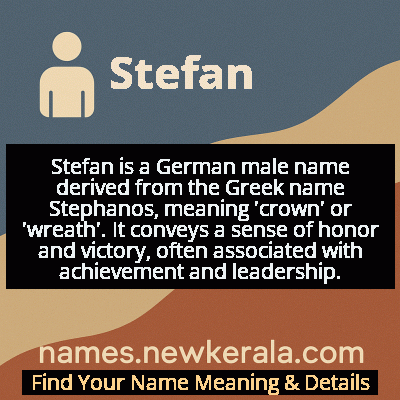Stefan Name Meaning & Details
Origin, Popularity, Numerology Analysis & Name Meaning of Stefan
Discover the origin, meaning, and cultural significance of the name STEFAN. Delve into its historical roots and explore the lasting impact it has had on communities and traditions.
Name
Stefan
Gender
Male
Origin
German
Lucky Number
2
Meaning of the Name - Stefan
Stefan is a German male name derived from the Greek name Stephanos, meaning 'crown' or 'wreath'. It conveys a sense of honor and victory, often associated with achievement and leadership.
Stefan - Complete Numerology Analysis
Your Numerology Number
Based on Pythagorean Numerology System
Ruling Planet
Moon
Positive Nature
Diplomatic, friendly, artistic, empathetic.
Negative Traits
Over-sensitive, moody, indecisive, prone to self-pity.
Lucky Colours
Green, cream, white.
Lucky Days
Monday.
Lucky Stones
Pearl, moonstone.
Harmony Numbers
1, 3, 4.
Best Suited Professions
Diplomats, mediators, caregivers, artists.
What People Like About You
Cooperative spirit, friendliness, artistic talent.
Famous People Named Stefan
Stefan Zweig
Writer
Influential Austrian novelist and biographer whose works explore psychology and human nature
Stefan Edberg
Tennis Player
Six-time Grand Slam champion and former World No. 1 known for his elegant serve-and-volley style
Stefan Sagmeister
Graphic Designer
Renowned designer known for innovative work with musicians like Lou Reed and The Rolling Stones
Stefan Banach
Mathematician
Founder of modern functional analysis and creator of Banach space theory
Name Variations & International Equivalents
Click on blue names to explore their detailed meanings. Gray names with will be available soon.
Cultural & Historical Significance
Extended Personality Analysis
Individuals named Stefan typically exhibit a distinctive blend of intellectual depth, practical wisdom, and quiet confidence that reflects the name's royal meaning. They often demonstrate natural leadership abilities combined with thoughtful consideration, making them effective in positions requiring both vision and careful execution. Stefans tend to be perceptive observers who process information thoroughly before acting, giving them a reputation for reliability and sound judgment. Their analytical minds frequently lead them toward careers in science, engineering, arts, or leadership roles where problem-solving skills are valued. While they can appear reserved in social situations, Stefans form deep, meaningful relationships and demonstrate remarkable loyalty to those they trust. They typically possess strong ethical compasses and value integrity in both personal and professional contexts. The creative aspect of many Stefans often manifests in artistic pursuits, innovative thinking, or unique approaches to traditional problems. This combination of logical reasoning and creative insight makes them particularly effective at bridging different perspectives and finding novel solutions to complex challenges.
Modern Usage & Popularity
In contemporary naming practices, Stefan maintains its status as a sophisticated European classic with global appeal. While its peak popularity in German-speaking countries occurred during the mid-to-late 20th century, it remains a respected choice that avoids being dated or overly common. Current naming data shows Stefan consistently ranking within the top 150-200 names in Germany and maintaining strong presence in Austria and Switzerland. The name has experienced a renaissance in international contexts, particularly in English-speaking countries where European names are increasingly valued for their distinctive yet accessible quality. Modern Stefans benefit from the name's international recognition while enjoying its relative uniqueness compared to more common alternatives. The name's strong phonetic structure and clear pronunciation across multiple languages contribute to its enduring appeal. Parents choosing Stefan today often appreciate its blend of traditional roots with contemporary sophistication, making it suitable for both professional environments and personal identity. The name's stability in popularity charts suggests it will continue to be a timeless choice rather than a passing trend.
Symbolic & Spiritual Meanings
The symbolic resonance of Stefan extends far beyond its literal meaning of 'crown' to encompass themes of achievement, protection, and eternal value. The crown represents not just royal authority but the culmination of personal growth and earned recognition - the idea that true honor comes from dedicated effort and moral integrity. In metaphorical terms, Stefan symbolizes the complete cycle of endeavor and reward, much like an athlete earning a victory wreath in ancient games. The name also carries protective symbolism, as crowns historically served as both markers of status and symbolic shields for those who wore them. This dual nature reflects the balance between personal accomplishment and responsibility toward others. The circular form of both crowns and wreaths connects to themes of eternity, continuity, and the cyclical nature of life's challenges and triumphs. In spiritual contexts, Stefan represents the soul's journey toward enlightenment and the ultimate 'crown of life' promised in religious traditions. These layered symbolic meanings make Stefan a name that inspires both ambition and wisdom, encouraging bearers to seek meaningful achievements that benefit both themselves and their communities.

